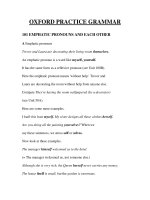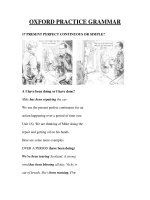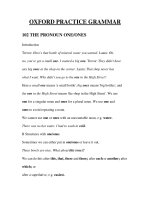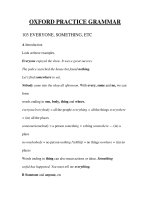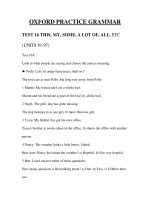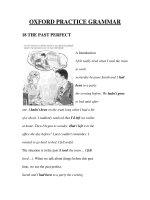OXFORD PRACTICE GRAMMAR 17
Bạn đang xem bản rút gọn của tài liệu. Xem và tải ngay bản đầy đủ của tài liệu tại đây (218.16 KB, 6 trang )
OXFORD PRACTICE GRAMMAR
17 PRESENT PERFECT CONTINUOUS OR SIMPLE?
A I have been doing or I have done?
Mike has been repairing the car.
We use the present perfect continuous for an
action happening over a period of time (see
Unit 16). We are thinking of Mike doing the
repair and getting oil on his hands.
Here are some more examples.
OVER A PERIOD (have been doing)
We've been touring Scotland. A strong
wind has been blowing all day. Vicky is
out of breath. She's been running. I've
been writing an essay. I'm tired now.
We normally use the continuous form when we
say how long.
Rachel has been playing music all day.
I've been ironing shirts since ten o'clock.
How long have you been learning to drive?
Mike has repaired the car.
We use the present perfect simple for a complete
action (see Unit 11). We are thinking of the
finished repair and the result of the repair - that
the car is all right now.
COMPLETE (have done)
We've finished our tour of Scotland. The
wind has blown a tree over. Vicky is here at
last. She's run all the way. I've written an
essay. I can hand it in now
We normally use the simple form when we say
how much/many.
Rachel has played at least twenty CDs.
I've ironed eight shirts.
How many driving lessons have you had?
B States and actions
We cannot normally use the continuous form with a state verb (see Unit 7).
I've known the secret for a long time, NOT I've been knowing the secret. My
parents have had this car for about ten years. We've never been very happy
here, I'm afraid.
Live and work (= have a job) can be continuous or simple, with no
difference in meaning.
We've been living here since 1992. OR We've lived here since 1992.
Sarah has been working for the company for three years now. OR Sarah
has worked for the company for
three years now.
17 EXERCISES
1 I have been doing or I have done? (A)
Look at these conversations and put in the correct form of the verb. Use
the present perfect continuous or simple.
► Sarah: I feel really tired.
Mark: It's because you've been doing (you / do) too much.
Sarah: Well, at least I've finished (I / finish) that report now, and I can relax.
1 David: Someone ....................................... ..........(leave) the ladder outside,
look.
Harriet: I expect that's Mike. (he / clean) the windows. I don't
think ..................................................................(he/ finish) yet.
2 Laura: You've got mud on your shoes.
Trevor: It's all right, I'll take them off...................................................... (I /
work) in the garden.
Laura: Yes, it looks a lot tidier. Well done............................. (you / do) a
good job.
3 Tom: ......................................................(I / hear) that you and Harriet are
building a garage.
How long ..................(you / do) that?
Mike: Oh, for about a month now. (we / do) ...................... about half of it.
2 I have been doing or I have done? (A)
What would you ask in these situations? Use the present perfect continuous
or simple.
? Your friend is wearing glasses. You've never seen him with glasses on
before. Ask him how long ...
How long have you been wearing glasses ?
? Nick is playing computer games. Ask him how many ...
How many computer games have you played ?
1 You meet a group of people walking across country. Ask them how many
miles ...
2 Some workmen are digging up the road outside Sarah's house. Ask her
how long ...
3 Laura is taking lots of photos of you and your friends. Ask her how many
...
4 You have just woken up from an afternoon sleep and seen that it is raining.
Ask your friend how long ...
3 I have been doing or I have done? (A-B)
Complete the conversation. Put the verbs in the present perfect continuous
or simple.
Laura: What are you doing, Trevor? (►) You've been (you / be) in here for
ages. You're making an awful
mess.
Trevor: (1) (I / clear) out this cupboard most of the afternoon. There's a
lot of old stuff in here. (2) (I / find) these, look.
I aura: (3) (you / sit) there staring at those old boots for the last five
minutes. (4) ...... (I / watch) you.
(5) ...................................................... (you / be) in a dream.

